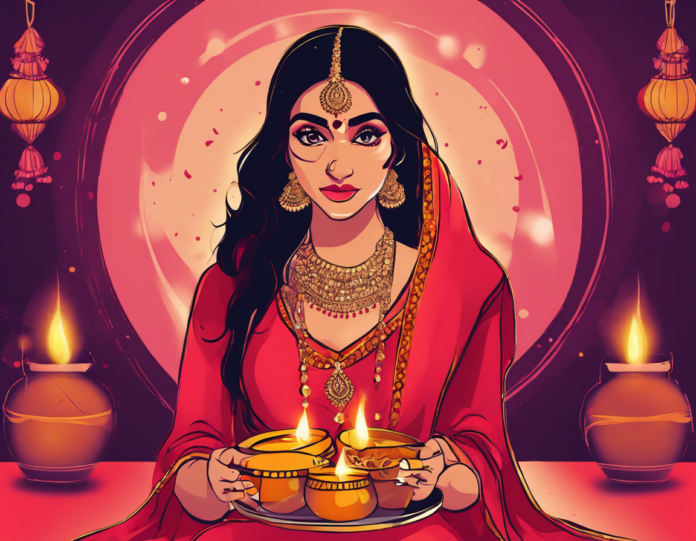The festival of Karwa Chauth is a significant and traditional hindu festival celebrated predominantly by married women in Northern India. This festival holds immense importance as it symbolizes the love and devotion between a husband and wife. The word “Karwa” means earthen pot while “Chauth” refers to the fourth day of the waning moon. Karwa Chauth is observed on the fourth day after the full moon in the Hindu lunisolar calendar month of Kartik. Married women observe a day-long fast, without consuming food or water, from sunrise to moonrise for the longevity and well-being of their husbands. This festival is a beautiful reflection of the sacred bond between spouses and is also an occasion for family gatherings, traditional rituals, and celebrations.
The Legend of Karwa Chauth
The origin of Karwa Chauth dates back to ancient Indian folklore and mythology, with several legends highlighting the significance of this auspicious day. One of the most popular stories is the legend of Queen Veervati. It is said that Queen Veervati endured immense hardships due to her strict fast on Karwa Chauth to protect her husband’s life. Her devotion and dedication ultimately moved Lord Yama, the God of Death, who granted her husband a longer life. This tale exemplifies the power of a wife’s prayers and sacrifice for her husband’s well-being.
Rituals and Traditions
Karwa Chauth is a day filled with various rituals and customs that women observe with utmost dedication and enthusiasm. The day typically begins with Sargi, a pre-dawn meal prepared by the mother-in-law, which the married woman consumes before sunrise in preparation for the day-long fast. Throughout the day, women engage in prayers, apply mehendi (henna) on their hands, and adorn themselves in traditional attire. Women gather in the late afternoon or early evening for the Karwa Chauth Puja, offering prayers to the moon for their husband’s long life. The fast is broken only after the moonrise, with the husband feeding his wife the first morsel of food and offering her water, signifying the end of the fast.
Significance of Moonrise
The most awaited moment during Karwa Chauth is the sighting of the moon. The appearance of the moon symbolizes the successful completion of the fast and reinforces the belief that the wife’s prayers have been heard, and her husband will be blessed with a long and prosperous life. Women break their fast by looking at the moon through a sieve and then at their husbands, seeking his blessings. This ritual is considered auspicious and is followed by a grand meal, known as the Sargi ka Dar.
Celebrations and Festivities
Karwa Chauth is not only a day of fasting and prayer but also a day of celebrations and adornment. Women dress in vibrant traditional attire, apply intricate mehendi designs on their hands, and accessorize with jewelry. Many women observe this festival with great fervor, organizing community gatherings, exchanging gifts with other married women, and participating in cultural events. The festive spirit is further enhanced with rituals, songs, dances, and delicious traditional dishes prepared for the occasion. The evening sky is illuminated with the mesmerizing sight of women offering prayers to the moon, creating a magical atmosphere of love and togetherness.
Modern Interpretations
In contemporary times, Karwa Chauth has evolved beyond its traditional roots and has become a celebration of love, companionship, and solidarity among married couples. While the essence of the festival remains unchanged, the rituals and customs have adapted to suit the modern lifestyle. Today, Karwa Chauth is not just limited to married women fasting for their husbands but has transformed into a celebration of mutual love and respect shared between partners.
FAQs (Frequently Asked Questions)
Q1: Can unmarried women observe Karwa Chauth?
A1: While Karwa Chauth is predominantly observed by married women, unmarried women, and engaged couples also participate in the festivities to pray for the well-being and longevity of their future spouses.
Q2: Is fasting mandatory for Karwa Chauth?
A2: Fasting on Karwa Chauth is a voluntary practice and is not mandatory. However, many women choose to observe the fast as a symbol of their love and devotion to their husbands.
Q3: Can pregnant or nursing women observe Karwa Chauth fast?
A3: Pregnant or nursing women are advised to consult with their healthcare providers before observing a day-long fast. It is essential to prioritize their health and well-being during this auspicious day.
Q4: What is the significance of applying mehendi during Karwa Chauth?
A4: Applying mehendi (henna) is considered auspicious during Karwa Chauth as it symbolizes love, prosperity, and good luck. It is also a way for married women to adorn themselves for the occasion.
Q5: How is Karwa Chauth celebrated in different regions of India?
A5: Karwa Chauth is celebrated with regional variations and customs across India. Each region has its unique traditions, rituals, and festive practices that add to the richness of this auspicious day.
In conclusion, Karwa Chauth is a time-honored festival that celebrates love, devotion, and the sacred bond between a husband and wife. The day is marked by rituals, fasting, prayer, and festivities that bring families together and strengthen the marital relationship. While the festival has deep-rooted cultural and religious significance, it also showcases the timeless values of love, companionship, and togetherness that resonate with people across generations.








